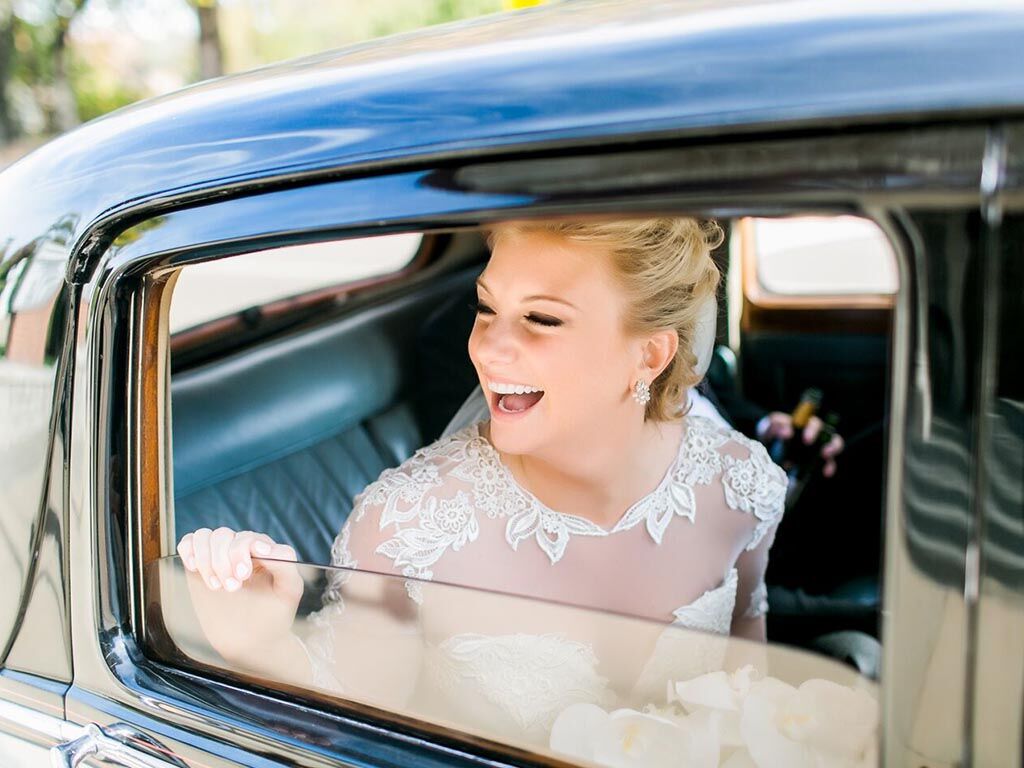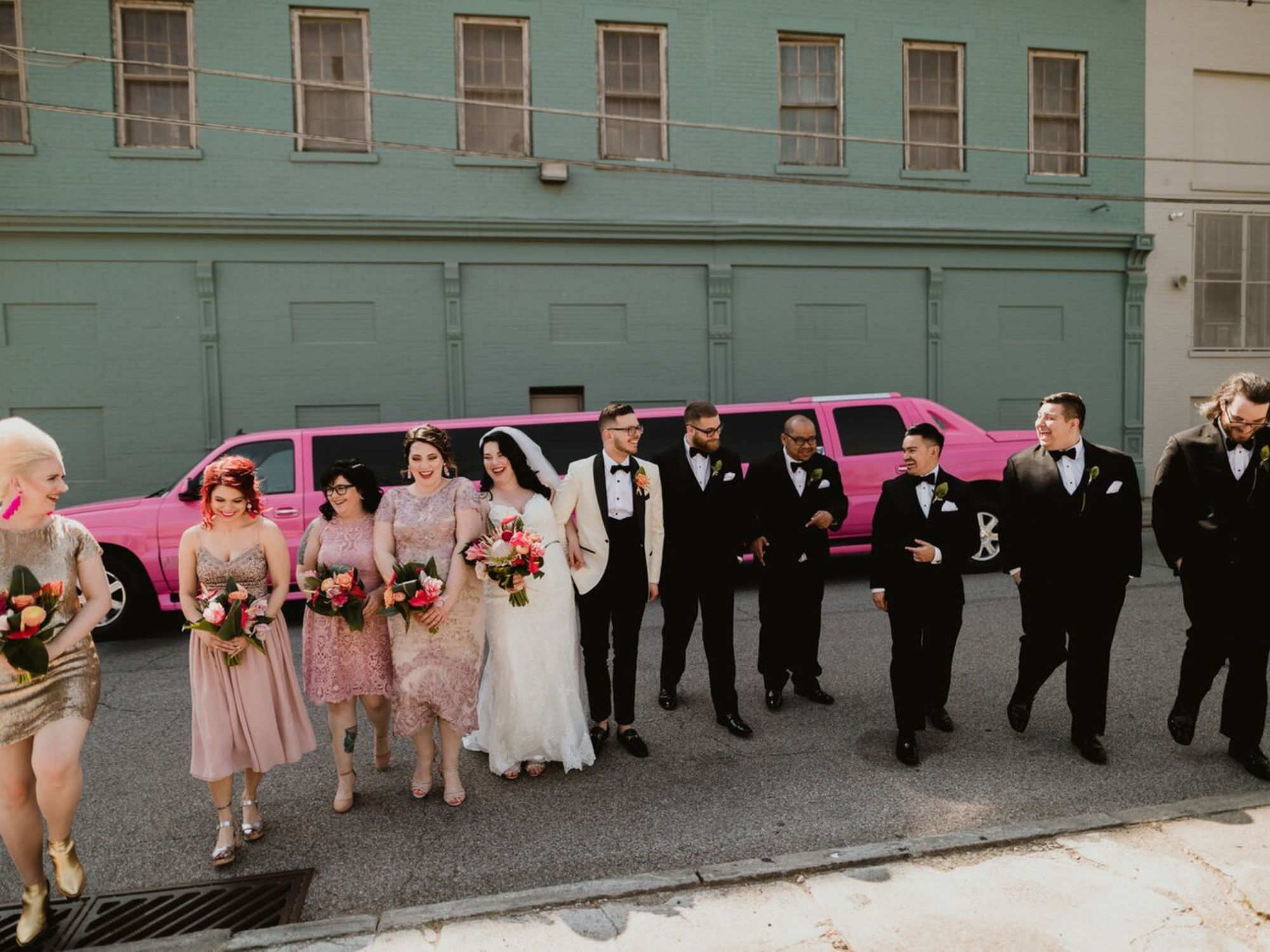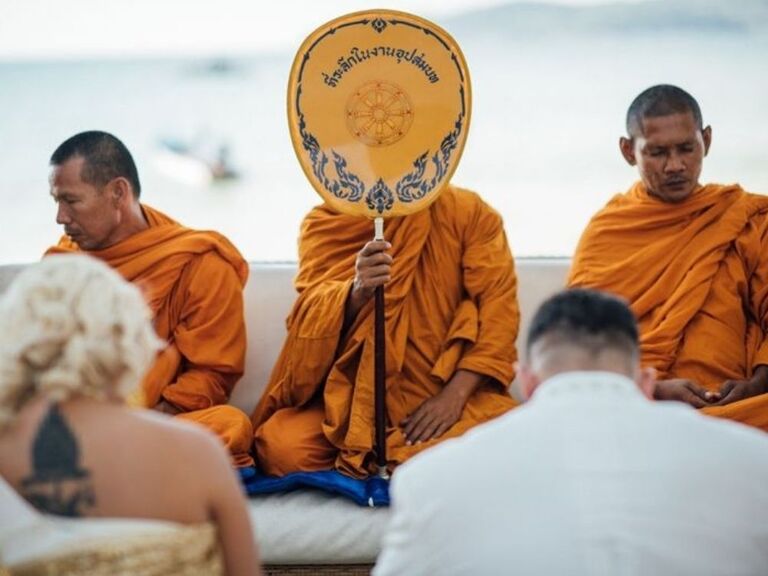The Ultimate Guide to Writing Buddhist Wedding Vows
In Buddhism, the focus on walking a path of transformation of inner potential is paramount. For many couples, their marriage ceremony and wedding day, surrounded by family members, is the perfect setting to practice the attitude of service that's a key component of walking the path of transformation.
Many modern couples have taken to holding a civil ceremony prior to their traditional Buddhist wedding ceremony. As such, couples may be already legally married during their Buddhist wedding ceremony which gives great flexibility when it comes to choosing what elements to include and what to say as part of the wedding vows.
One thing that differentiates Buddhist vows from those exchanged by couples of different religions is that Buddhist wedding vows don't have to be spoken aloud by the nearly-newlyweds in order to enter into wedlock. Buddhist marriage vows may be spoken, however, many couples may choose instead to read them silently. The Buddhist practice allows couples to decide what's best for them and to plan the wedding ceremony to align with whatever will best lead them as a couple toward enlightenment.
While some Buddhist weddings are officiated by Buddhist monks, many couples will forgo that option in favor of having a close friend or mentor officiate the wedding ceremony. Once again, the couple's decision on who will officiate the wedding should be informed by the path they believe will best lead them on the path of inner potential.
What to Include in Your Buddhist Wedding Vows
These three elements are generally included in Buddhist wedding ceremonies.
Buddhist Prayer and Meditation
Prior to exchanging traditional wedding vows, Buddhist weddings generally begin with a prayer to the Buddha or meditation.
Individual Vows
As is the case with many religious wedding vows, like Christian wedding vows and Jewish wedding vows, individual proclamations are a key component of a Buddhist ceremony.
Joint Vows
The "we do" section, or joint vows, included in Buddhist wedding vows set them apart from the vows exchanged by other faith practices. During this part of the ceremony, the officiant will read a number of promises, to which the couple will respond, in unison, "we do." Following the joint vows, there is the exchange of rings as the culmination of the wedding ceremony and then the pronouncement that the couple is now wed.
Traditional Buddhist Wedding Vows Template
Let these wedding vow examples inspire your own wedding vows as you craft your matrimony script.
Buddhist Prayer and Meditation
Option 1: Officiant: [ ] and [ ] are happy today not only because they can share the joy of their love for each other with friends and family, but also because they have the opportunity to express their aspirations for the future.
Option 2: Couple: Knowing how deeply our lives intertwine with each other and with all beings, we undertake the practice of growing in happiness each day.
Knowing how deeply our lives intertwine with each other and with all beings, we undertake the practice of using whatever arises in our relationship for our own awakening and for the awakening of all beings.
Knowing how deeply our lives intertwine with each other and with all beings, we undertake the practice of receiving everything in our relationship as teachings meant to open our hearts.
Knowing how deeply our lives intertwine with each other and with all beings, we undertake the practice of revealing ourselves fully in our relationship, striving toward complete vulnerability and honesty.



Knowing how deeply our lives intertwine with each other and with all beings, we undertake the practice of listening without judgment.
Knowing how deeply our lives intertwine with each other and with all beings, we undertake the practice of feeling and releasing all obstructions to being fully present in each moment.
Option 3: "Today we promise to dedicate ourselves completely to each other, with body, speech, and mind. In this life, in every situation, in wealth or poverty, in health or sickness, in happiness or difficulty, we will work to help each other perfectly. The purpose of our relationship will be to attain enlightenment by perfecting our kindness and compassion toward all sentient beings." Lama Thubten Yeshe, December 1979
Joint Vows
Officiant: [ ] and [ ] do you pledge to help each other to develop your hearts and minds, cultivating compassion, generosity, ethics, patience, enthusiasm, concentration, and wisdom as you age and undergo the various ups and downs of life and to transform them into the path of love, compassion, joy, and equanimity?
Couple: "We do."
Officiant: Recognizing that the external conditions in life will not always be smooth and that internally your own minds and emotions will sometimes get stuck in negativity, do you pledge to see all these circumstances as a challenge to help you grow, to open your hearts, to accept yourselves, and each other; and to generate compassion for others who are suffering?
Couple: "We do."
Officiant: Understanding that just as we are a mystery to ourselves, each other person is also a mystery to us, do you pledge to seek to understand yourselves, each other, and all living beings, to examine your own minds continually and to regard all the mysteries of life with curiosity and joy?
Couple: "We do."
Officiant: Do you pledge to preserve and enrich your affection for each other, and to share it with all beings? To take the loving feelings you have for one another and your vision of each other's potential and inner beauty as an example and rather than spiraling inwards and becoming self-absorbed, to radiate this love outwards to all beings?
Couple: "We do."
Individual Vows
Option 1: I, [ ] take you [ ] to be my faithful husband/ faithful wife, my partner in life, and my one true love. I will cherish our friendship and love you today, tomorrow, and forever. I will trust you and honor you I will laugh with you and cry with you. Through sickness and health.
Option 2: I, [ ] take you [ ] to be my husband/wife, my partner in life and my one true love. I will cherish our friendship and love you today, tomorrow, and forever. I will trust you and honor you. I will laugh with you and cry with you. Through the best and the worst. Through the difficult and the easy. Whatever may come I will always be there. As I have given you my hand to hold. So I give you my life to keep.
Personalizing Buddhist Wedding Vows
While some faith practices may not allow for personalization due to stringent wedding traditions (Catholic wedding vows, for example, must follow a strict script), Buddhism allows each couple to decide for themselves what's best regarding their wedding vows and marriage ceremony. Much like with non-religious wedding vows, Buddhist couples can take the above templates but customize them to best fit their own needs.





















